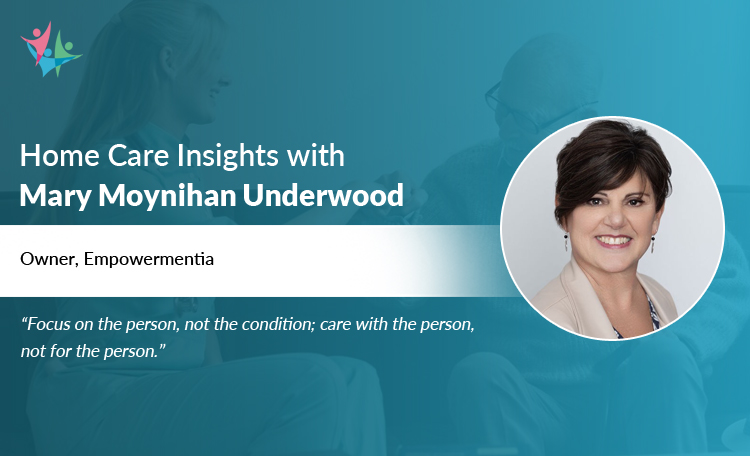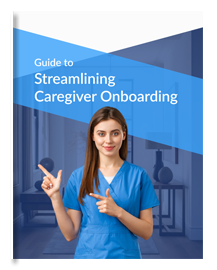In Conversation with Mary Moynihan Underwood to Bring Her Insights on Supporting Individuals with Dementia
Caring for the elderly with dementia is about managing their health and preserving their dignity while enhancing their quality of life. It’s essentially about honoring a life lived well.
And offering support goes beyond giving medication reminders. Create a safe and familiar environment to facilitate positive interactions and stimulate their cognitive abilities. Most importantly, honor their preferences and respect their emotions, even when communication is difficult.
Offer them a sense of security and connection, a reminder that they are still loved and valued members of our society. It also brings a profound sense of purpose and fulfillment to those who care for them.
Essentially, caring for seniors with dementia is about providing holistic support that addresses their physical, emotional, and social needs, thus improving their life experience. It’s a responsibility that requires compassion, understanding, and respect for their unique challenges.
To shed some light on the same, we interviewed a home care industry expert to bring her perspective on supporting individuals with dementia.

Who Did We Interview?
Mary has over 35 years of experience working in various memory care settings. In this span, she has developed and implemented several innovative and evidence-based programs and practices that enhance the well-being and dignity of individuals with dementia and their caregivers.
Mary is also passionate about providing education, support, and resources to caregivers, families, and communities on the journey of dementia.
She has partnered with local and national organizations to offer training and speaking engagements on emotion-based care, dementia-friendly design, and family engagement.
Mary has multiple awards to her credit for her outstanding work and advocacy in memory care.
Let’s now delve into what she has to say about the home care industry:
Question 1: What, in your opinion, can caregivers do to support seniors with dementia?
The best thing caregivers can do is to know who they are as a person. What did they do? What do they like? What is their sense of humor like? What gives them purpose? What are they afraid of?
Professional caregivers know a lot about the condition, but we care for the people, not the condition. Further, caregivers should focus on caring WITH the person, not FOR the person. The condition takes away so much from the person, we as caregivers should not be doing the same.
Question 2: Do dementia patients need to make lifestyle changes to minimize the impact?
Unfortunately, this question is often addressed in a family when it is too late; having the conversation about lifestyle, desires, and wants must happen before there is a need for care.
Long before my dad was diagnosed with Frontotemporal Dementia (FTD), he and I talked about what things would look like if he ever needed more care due to physical or cognitive changes. The conversation was not geared towards specific scenarios but the need to trust each other.
The promise was, “We’ll make sure we do the best for you, whatever that looks like.”
Question 3: How should family members and caregivers communicate with dementia patients?
Family members and caregivers should communicate with individuals with dementia in the way they communicate with anyone else: with compassion, intention, focus, and understanding.
Some slight changes may be needed, such as smaller amounts of information at a time and minimizing distractions. But overall, as I stated in the first question, we need to focus on the person, not the condition.
When listening to a person with dementia, especially as they are a bit more progressed, it is important to listen more to the emotions than the words. The phrase I use is, “Listen with your heart, not your ears.”
Question 4: Do caregivers and family members need to take steps to make the elderly’s house dementia friendly (you can talk about making houses safe for preventing hazards)?
As judgment, decision-making, and sensory changes happen with the condition, pertinent steps must be taken to make the home dementia friendly. Several changes can be made, including simple, low-tech steps such as leaving notes/signs with cues, removing knobs off the stove to prevent it from being used without supervision, and placing alarms on doors.
There are also higher-tech options, such as geofencing and tracking devices.
Utilizing a Physical Therapist to help assess the environment is also something that I often recommend when mobility issues arise.
Question 5: What advice do you give to caregivers dealing with dementia older adults?
Educate yourself about what’s happening now and what lies ahead. The simple principle of “Hope for the best but prepare for the worst” applies. Attend a support group, reach out to organizations that can provide information, attend presentations, and gather information from reliable resources.
My next piece of advice is for caregivers to give themselves some grace. It is a bumpy road, one that’ll bring with it many challenges. There are times when you will not be as patient as you would like to be and times when you don’t know what you should be doing. Allow yourself the grace of not being perfect.
Simply do the best you can with the resources you have.
In Conclusion
Caring for seniors with dementia is a multifaceted task that requires understanding the person beyond the condition. Early conversations about lifestyle changes are crucial.
Communication should be compassionate and focused on the person, not the condition. Making the home dementia-friendly, through low-tech and high-tech means, is essential.
Caregivers should educate themselves, prepare for challenges, and give themselves grace. Remember, the journey is about doing the best with the resources at hand.
